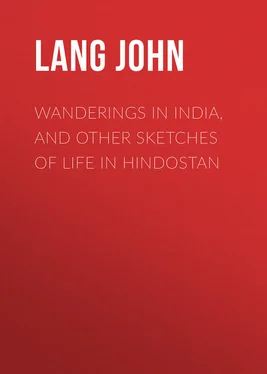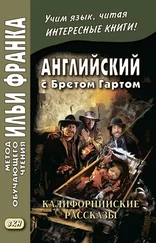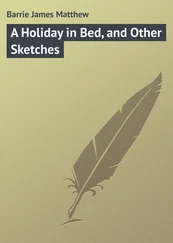John Lang - Wanderings in India, and Other Sketches of Life in Hindostan
Здесь есть возможность читать онлайн «John Lang - Wanderings in India, and Other Sketches of Life in Hindostan» — ознакомительный отрывок электронной книги совершенно бесплатно, а после прочтения отрывка купить полную версию. В некоторых случаях можно слушать аудио, скачать через торрент в формате fb2 и присутствует краткое содержание. Жанр: literature_19, foreign_antique, foreign_prose, Путешествия и география, на английском языке. Описание произведения, (предисловие) а так же отзывы посетителей доступны на портале библиотеки ЛибКат.
- Название:Wanderings in India, and Other Sketches of Life in Hindostan
- Автор:
- Жанр:
- Год:неизвестен
- ISBN:нет данных
- Рейтинг книги:3 / 5. Голосов: 1
-
Избранное:Добавить в избранное
- Отзывы:
-
Ваша оценка:
- 60
- 1
- 2
- 3
- 4
- 5
Wanderings in India, and Other Sketches of Life in Hindostan: краткое содержание, описание и аннотация
Предлагаем к чтению аннотацию, описание, краткое содержание или предисловие (зависит от того, что написал сам автор книги «Wanderings in India, and Other Sketches of Life in Hindostan»). Если вы не нашли необходимую информацию о книге — напишите в комментариях, мы постараемся отыскать её.
Wanderings in India, and Other Sketches of Life in Hindostan — читать онлайн ознакомительный отрывок
Ниже представлен текст книги, разбитый по страницам. Система сохранения места последней прочитанной страницы, позволяет с удобством читать онлайн бесплатно книгу «Wanderings in India, and Other Sketches of Life in Hindostan», без необходимости каждый раз заново искать на чём Вы остановились. Поставьте закладку, и сможете в любой момент перейти на страницу, на которой закончили чтение.
Интервал:
Закладка:
Mrs. Apsley is not angry with her husband for staying up till daylight. She thinks a little dissipation does him good; and it is but a very little that Jack indulges in, for he is a good husband and a good father. Jack has a severe headache, but he won't confess it. He says he never touched the champagne, and only drank two glasses of brandy and water. But who ever did touch the champagne, and who ever did drink any more than two glasses of brandy and water? Jack came home with his pockets filled with almonds, raisins, prunes, nutcrackers, and two liqueur glasses; but how they got there he has not the slightest idea – but I have. Wywell, from a sideboard, was filling his pockets all the while he was singing "Rule, Britannia."
"Mrs. Apsley, I have some news for you."
"What is it, Captain Wall?"
"The club gives a ball on the 7th of June."
"You don't say so."
"And what is more, a fancy ball."
The tiffin is brought in. Mulligatawny soup and rice, cold lamb and mint sauce, sherry and beer. The Apsleys are very hospitable people; but Mary, who rules the household, never exceeds her means for the sake of making a display.
The soup and a glass of wine set Jack up; and he becomes quite chirpy. He proposes that he and I and Wywell shall go to the fancy ball as middies, and that Mary shall appear as Black-eyed Susan. Then, darting off at a tangent, he asks me if I remember when we were lying off Mount Edgecombe, just before sailing for South America? But he requires a little more stimulant, for the tears are glistening in his soft blue eyes when he alludes to the death of poor Noel, a middy whom we buried in the ocean a few days before we got to Rio. In a very maudlin way he narrates to his wife the many excellent qualities of poor Noel. She listens with great attention; but, observing that his spontaneous emotion is the result of the two over-night glasses of brandy – plus what he cannot remember drinking over-night – she suggests that Jack shall make some sherry cobbler. What a jewel of a woman art thou, Mrs. Apsley! Several of the men who returned home, as Jack did, none the better for their potations, have been driven by their wives' reproaches to the club, where they are now drinking brandy and soda-water to excess; while here is your spouse as comfortable as a cricket on a hearth; and now that he confesses he was slightly screwed, you, with quiet tact, contradict his assertion.
For the next week the forthcoming fancy ball to be given by the club will be the chief topic of conversation amongst the visitors at Mussoorie. Mrs. Ludlam is in immense demand. She knows the character that each lady will appear in; but it is useless to attempt to extract from her the slightest particle of information on that head. This ball will be worth seven hundred and fifty rupees to Mrs. Ludlam.
Let us keep away from the club for a few days; for, after several officers have been victimized at play, their friends are apt to talk about the matter in an unpleasant manner. This frequently leads to a quarrel, which I dislike to witness.
Where shall we go? To the Dhoon. It is very hot there; but never mind. No great-coat, no fires, an hour hence; but the very lightest of garments and a punkah. The thermometer is at eighty-five degrees there. The Dhoon is not a healthy place in the summer. It must have been the bed of an enormous lake, or small inland sea. Its soil being alluvial, will produce anything: every kind of fruit, European and tropical. You may gather a peach and a plantain out of the same garden. Some of the hedges in this part of the world are singularly beautiful, composed of white and red cluster roses and sweetbriers. There is an excellent hotel in the Dhoon, where we are sure to meet people whom we know.
Sure enough, I find a Party of five at the hotel; all club men, and intimate friends of mine. They, too, have come down to avoid being present on the first settling day; for if there should be any duelling, it is just possible that some of us might be asked to act as second.
We must dine off sucking-pig in the Dhoon. The residents at Mussoorie used to form their pig-parties in the Dhoon, just as the residents of London form their whitebait banquets at Greenwich. I once took a French gentleman, who was travelling in India, to one of these pig-parties, and he made a very humorous note of it in his book of travel, which he showed to me. Unlike most foreigners who travel in English dominions, he did not pick out and note down all the bad traits in our character; but gave us credit for all those excellent points which his experience of mankind in general enabled him to observe.
The Governor-General's body-guard is quartered just now in the Dhoon, and there is a Goorkha regiment here. The Dhoon will send some twenty couples to the fancy ball on the 7th. Every lady in the place has at this moment a Durzee (man tailor) employed in her back verandah dress-making. We are admitted to the confidence of Mrs. Plowville, who is going as Norma. And a very handsome Norma she will make; she being rather like Madame Grisi – and she knows it.
We return to the club on the 2nd of June. There has been a serious dispute, and a duel has been fought; but happily, no blood shed. The intelligence of the gambling at the club has reached the Commander-in-Chief at Simlah; and he has ordered that the remainder of the leave granted to Captains Locke and Bunyan be cancelled, and that those officers forthwith join their respective regiments. The victims also have been similarly treated; yet every one of these remanded officers came up here on medical certificate.
It is the morning of the 7th of June. The stewards of the ball are here, there, and everywhere, making arrangements. Several old hands, who hate and detest balls, and who voted against this ball, are walking about the public room, protesting that it is the greatest folly they ever heard of. And in their disgust they blackball two candidates for admission who are to be balloted for on the 10th instant. They complain that they can get no tiffin, no dinner, no anything. But the stewards only laugh at them.
The supper has been supplied by Monsieur Emille, the French restaurateur, and a very splendid supper it is. It is laid out in the dining-room. Emille is a great artist. He is not perhaps equal to Brazier – that great man whom Louis Philippe gave to his friend, Lord William Bentinck, when Lord William was going out to govern India – but Emille, nevertheless, would rank high even amongst the most skilful of cuisiniers in Europe.
It is a quarter past nine, and we of the club are ready to receive our guests. The ladies come in janpans; their husbands following them on horseback or on foot. It is a beautiful moonlight night. We are always obliged to wait upon the moon when we give a ball in Mussoorie. Before ten o'clock the room is crowded. There are present one hundred and thirty-six gentlemen, and seventy-five ladies. Of the former nine-tenths are soldiers, the remainder are civilians. Of the latter, seventy are married; the remaining five are spinsters.
Here we all are in every variety of costume – Turks, Greeks, Romans, Bavarian broom-girls, Medoras, Corsairs, Hamlets, Othellos, Tells, Charles the Seconds, and Quakers. Many have not come in fancy costume, but in their respective uniforms; and where do you see such a variety of uniforms as in an Indian ball-room? Where will you meet with so great a number of distinguished men? There is the old general: that empty sleeve tells a tale of the battle of Waterloo. Beside him is a general in the Company's service, one who has recently received the thanks of his country. He has seen seventy, but there is no man in the room who could at this very time endure so great an amount of mental or bodily fatigue. That youngster to the right of the general is to be made a brevet-major and a C.B. as soon as he gets his company. He is a hero, though a mere boy. That pale-faced civilian is a man of great ability, and possesses administrative talents of the very highest order. Seated on an ottoman, talking to Mrs. Hastings, is the famous Hawkins, of the Third Dragoons. Laughing in the side doorway is the renowned William Mumble. He is the beau ideal of a dashing soldier. Yonder is Major Starcross, whose gallantry in Affghanistan was the theme of admiration in Europe. And there is Colonel Bolt, of the Duke's Own. All of these men have been under very hot fire – the hottest that even Lord Hardinge could remember. All of them are decorated with medals and ribbons. Where will you see handsomer women than you frequently meet in a ball-room at Mussoorie or Simlah? Amongst those now assembled there are three who, at any court in Europe, would be conspicuous for their personal attractions – Mrs. Merrydale, Mrs. Plowville, and Mrs. Banks. Mrs. Apsley is a pretty little woman; but the three to whom I have alluded are beautiful.
Читать дальшеИнтервал:
Закладка:
Похожие книги на «Wanderings in India, and Other Sketches of Life in Hindostan»
Представляем Вашему вниманию похожие книги на «Wanderings in India, and Other Sketches of Life in Hindostan» списком для выбора. Мы отобрали схожую по названию и смыслу литературу в надежде предоставить читателям больше вариантов отыскать новые, интересные, ещё непрочитанные произведения.
Обсуждение, отзывы о книге «Wanderings in India, and Other Sketches of Life in Hindostan» и просто собственные мнения читателей. Оставьте ваши комментарии, напишите, что Вы думаете о произведении, его смысле или главных героях. Укажите что конкретно понравилось, а что нет, и почему Вы так считаете.












